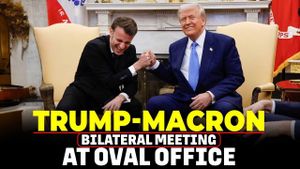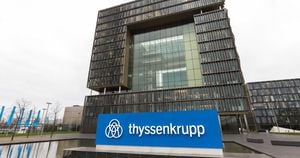During a highly anticipated meeting at the White House on February 24, 2025, US President Donald Trump welcomed French President Emmanuel Macron for discussions centered on Ukraine, European security, and economic ties. The gathering signified the first visit by a European leader since Trump began his second term on January 20. With rising tensions on the continent, the dialogue between these two leaders aimed to navigate the intensifying strains over the war in Ukraine and transatlantic relations.
Macron's visit came at a time when public sentiment across Europe indicates growing unease with the United States' heavy-handed approach to foreign policy, particularly concerning Ukraine and its security. The meeting was characterized by displays of warmth, with both leaders indulging in their characteristic mutual admiration. Trump referred to Macron as "a very special man," and they exchanged handshakes, embraces, and compliments, reminiscent of their prior cordial interactions.
Despite the friendly atmosphere, the discussions did not shy away from contentious topics. Macron, echoing sentiments shared by many European leaders, asserted the imperative for Ukraine's sovereignty as negotiations for peace continue. “This peace must allow for Ukrainian sovereignty and allow Ukraine to negotiate with other stakeholders,” Macron declared, countering Trump's suggestions of potential territorial concessions by Ukraine.
Macron also corrected Trump on the misconception surrounding European aid to Ukraine. Trump had stated, “Europe is loaning the money to Ukraine,” implying support would be repaid. Taking the initiative, Macron interjected, saying, “No, to be frank, we paid 60 percent of the total effort,” clarifying the nature of funding as comprising loans, guarantees, and grants provided by European nations. Trump, receptive yet incredulous, replied, “If you believe it, it's okay with me,” highlighting the delicate balance of camaraderie and disagreement during their talks.
Trade policy surfaced as another pivotal point of contention. Macron addressed Trump's potential tariffs against European goods, advocating for "fair competition" to promote mutual prosperity. “We want to have more prosperity on both sides of the Atlantic,” he stated during discussions at the White House, urging the US to reconsider confrontational economic strategies toward Europe.
Echoing international perspectives, British broadcaster Piers Morgan remarked on Macron's adept handling of Trump, emphasizing, “No world leader manages Trump as well as Macron. Friendly but firm, respectful but not afraid to stand up to him when he thinks he’s wrong. And Trump respects him for it,” he proclaimed.
Another significant topic discussed was the need for European nations to take more responsibility for collective security. Acknowledging Trump’s views on Europe’s reliance on the US for defense, Macron stated, “European countries need to do more… to share the security burden more fairly.” Both leaders agreed upon the possibility of deploying a European peacekeeping force to Ukraine as part of any peace agreement. Macron asserted, “They would not be along the front lines. They would not be part of any conflict. They would be there to assure peace is respected.” Trump reinforced the idea of American backing for any coalition established.
Discussion also turned toward the controversial mineral deal Trump has been advocating, which aims to secure Ukrainian control over its rare mineral resources—a move Ukrainian President Volodymyr Zelensky has expressed strong reservations about. Trump, pushing for closure on this agreement, stated, “We’re getting very close” and insisted it would be beneficial for both parties. Macron cautiously supported the effort, anticipating Trump would soon “sign” the deal and expressing approval for American involvement.
Perceptions of Russian President Vladimir Putin emerged as another key point of divergence. While Trump has shown interest historically in diplomatic relations with Putin, referring to potential meetings, Macron took a stern stance, characterizing Russia as the clear aggressor. “Putin violated the peace,” Macron stated, countering Trump’s insinuation of Ukraine's provocations as the cause for conflict.
Overall, the meeting illustrated the challenging dynamics underpinning US-European relations as leaders strive to maintain unity amid evident disparities. Despite the pervasive camaraderie and public gestures of friendship, substantial disagreements overshadowed their exchanges, raising questions about the efficacy of warmth in diplomatic negotiations covering dire issues. Macron left Washington without definitive commitments from Trump, indicating the complex road still lying ahead for transatlantic cooperation.
Looking forward, the challenges Macron faced during the meeting were echoed by UK Labour leader Keir Starmer, who is also scheduled for discussions with Trump this week. Starmer’s focal aim is to strengthen the transatlantic alliance, mirroring Macron's endeavors to secure support against the backdrop of rising geopolitical tensions. Yet, as political dynamics continue to shift, the call for stability and unified action remains more urgent than ever.



